Concrete Batching Plant Selection Guide

Abstract: Concrete mixing plants play an important role in construction and infrastructure projects. This article will introduce key factors such as price, specifications and performance of concrete mixing plants, and discuss how concrete mixing plants work and the return on investment. Information on concrete mixing plant manufacturers, suppliers, rental and maintenance will also be provided to help the reader make an informed decision in selecting the right concrete mixing plant.
As a key equipment for producing concrete, concrete mixing plant is crucial to the successful implementation of engineering projects. However, the existence of various concrete mixing plants in the market with different prices, specifications and models makes the selection quite complicated. This article will introduce the relevant factors one by one to help readers understand the key characteristics of concrete mixing plants.
[Working Principle]
The working principle of concrete mixing plant is to mix the raw materials such as cement, aggregate, admixture and water in a certain proportion and then mix them by concrete mixer to form a uniform concrete. During the mixing process, the mixing arm or spiral mixing arm of the mixer rotates to mix the raw materials fully to ensure the uniform quality of concrete. The concrete is then unloaded onto a discharge hopper or conveyor belt and transferred to a vehicle such as a concrete transport vehicle or concrete pump. The whole process relies on batching, mixing and discharging to work in tandem, enabling the concrete mixing plant to produce quality concrete materials efficiently. The mixing plant adopts different mixing methods and control systems according to different process requirements and production batches.
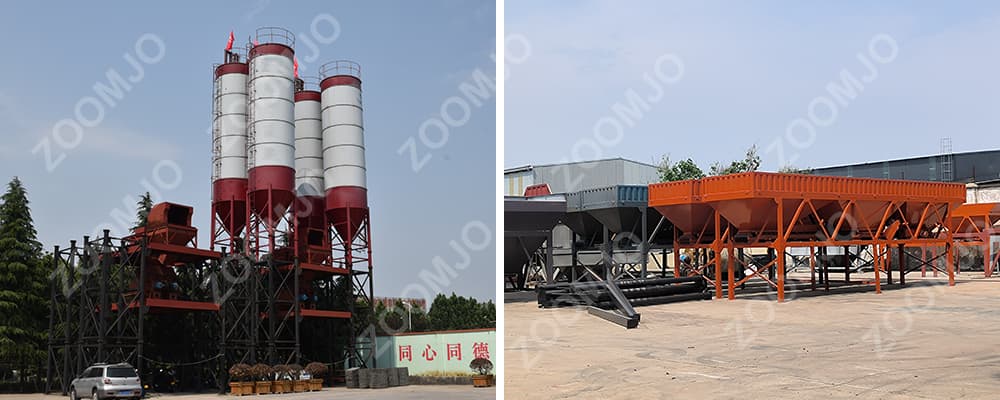
[Price]
The price of a concrete mixing plant varies depending on a variety of factors, including equipment size, model, brand, production capacity, degree of automation, and additional features. Generally speaking, the price of concrete mixing plant with larger capacity and higher performance will be higher. In addition, pricing can vary from region to region and from manufacturer to manufacturer.
In general, small concrete mixing plants range in price from several thousand dollars to hundreds of thousands of dollars. Medium-sized concrete mixing plants may range in price from hundreds of thousands of dollars to millions of dollars. Large concrete mixing plants can cost over millions of dollars.
When purchasing a concrete mixing plant, in addition to the price of the equipment, you also need to consider the associated transportation costs, installation costs, and after-sales service. It is also an effective strategy to negotiate and negotiate with the supplier or manufacturer to get the best price and discount.
It is worth noting that the price of a concrete mixing plant is an important investment consideration, but the value of the equipment should not be assessed by the price alone. You also need to consider the quality, performance, durability and maintenance cost of the equipment as well as the reputation and after-sales support of the manufacturer to choose the concrete mixing plant that best suits your needs and budget.
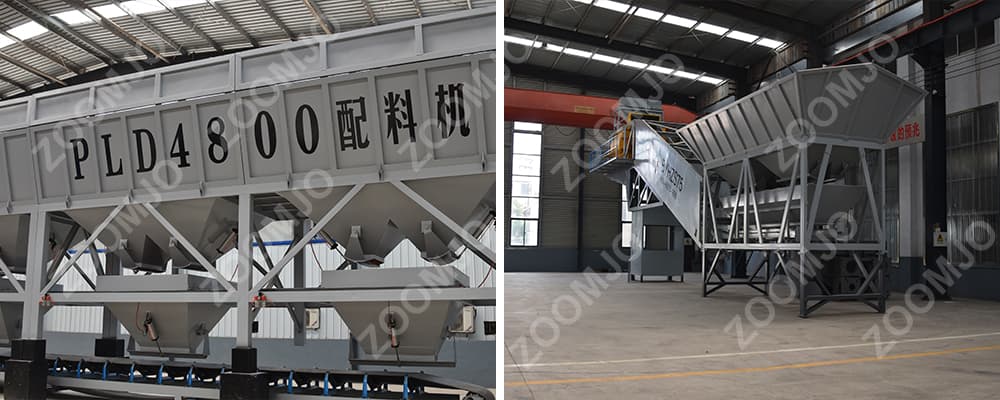
[Mixing Plant Type]
Concrete mixing plants can be classified according to different classification standards. The following are some common concrete mixing plant classifications:
Classification according to mobility:
Mobile concrete mixing plant: With wheels or tracks, it can be easily moved to different sites.
Stationary concrete mixing plant: Installed in a fixed position, suitable for long-term or large-scale projects.
Classified according to the production method:
Continuous Concrete Mixing Plant: Continuous production of concrete, suitable for large scale projects.
Batch type concrete mixing plant: concrete is produced in batches, suitable for small and medium-sized projects.
According to the mixing method:
Forced Concrete Mixing Plant: The mixer achieves uniform mixing of concrete through forced mixing.
Free-fall Concrete Mixing Plant: The raw materials fall freely, relying on gravity and collision to achieve the mixing of concrete.
Classified according to the control method:
Semi-automatic concrete mixing plant: The batching and mixing process requires manual intervention.
Automatic Concrete Mixing Plant: The batching and mixing process is controlled by computer and is more automatic.
Classification according to the batching method:
Dry Concrete Mixing Plant: The raw materials are prepared in advance and mixed with water after dry mixing.
Wet Concrete Mixing Plant: The raw materials are mixed by adding the right amount of water during batching.
According to the classification of aggregate conveying method:
Bucket type concrete mixing plant: The raw materials (cement, aggregate, mixer and water) are lifted to the mixer for mixing by bucket lifting device. Usually, this type of mixing plant is suitable for small or mobile projects with compact structure and flexible handling. They are commonly used in construction sites, road construction and small infrastructure projects.
Belt Type Concrete Mixing Plant: Belt conveyors are used to transfer raw materials to the mixer for mixing. This type of batching plant has efficient raw material transfer capacity and continuous production capacity for large projects and concrete production where high throughput is required. Belt type concrete mixing plants are commonly used in large water conservancy projects, bridge construction and industrial buildings.
These classifications are only some of the common ones, but there are actually other classifications and special types of concrete mixing plants. When choosing a concrete mixing plant, you need to evaluate the project according to its demand, budget and available space, and communicate and consult with the manufacturer or supplier in detail to choose the most suitable classification and type.

[Specifications and Types]
The specifications and types of concrete mixing plant can be classified according to the production capacity, batching method and mixer type. The following are some common specifications and types:
Specifications:
Small concrete mixing plant: Usually the production capacity is between 10 m3/hour and 40 m3/hour.
Medium Concrete Mixing Plant: Usually the production capacity is between 50 m3/hour and 90 m3/hour.
Large Concrete Mixing Plant: Usually the production capacity is above 100 m3/hour.
Batching method:
Silo Batching Concrete Mixing Plant: The raw materials are batched through the storage system, which can have the function of storage and proportioning of various aggregates and admixtures.
Weighing Batching Concrete Mixing Plant: The raw materials are precisely batched through the weighing system, which can realize the precise proportion control.
Mixer type:
Horizontal shaft concrete mixer with double mixing arms: Horizontal layout with double mixing arms, suitable for high strength concrete mixing.
Horizontal spiral mixing arm concrete mixer: horizontal layout with spiral mixing arm, suitable for mixing ordinary concrete.
Vertical mixer: Adopting vertical layout with mixing spiral, suitable for small concrete mixing plants or projects with special needs.
These specifications and types are just some common classifications, there are actually more variants and combinations to choose from. When choosing a concrete mixing plant, you need to evaluate the project requirements, budget and production volume to choose the right specification and type.
[Performance]
The performance of concrete mixing plant is crucial to the quality and efficiency of producing concrete. Performance indicators include mixing effectiveness, mixing time, discharge speed, durability, etc. A high performance concrete mixing plant can ensure uniform mixing and efficient production of concrete, reducing quality problems and time delays in the project.
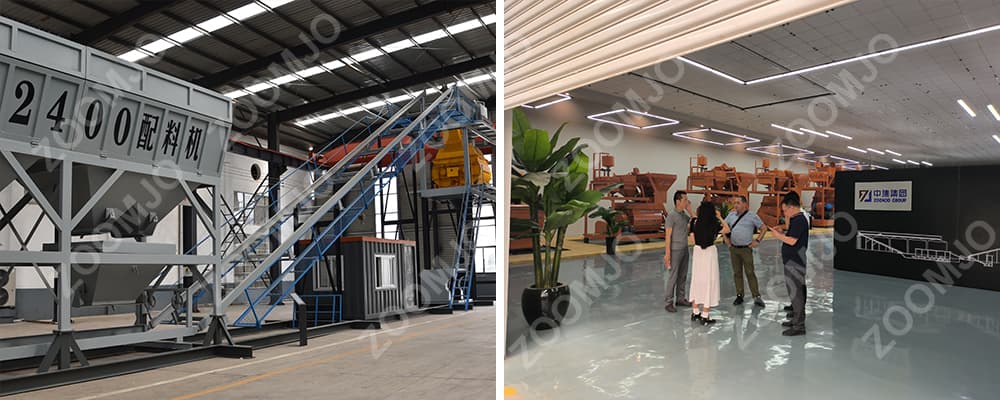
[Manufacturers and Suppliers]
Choosing a reliable concrete mixing plant manufacturer and supplier is the key to ensure the quality of the equipment. Choosing well-known and experienced manufacturers and suppliers in the market can provide high quality concrete mixing plants with reliable after-sales service. The reliability of manufacturers and suppliers can be assessed by:
Referring to reputation and reputation: Find out the reputation and reputation of manufacturers and suppliers. You can obtain relevant information by searching the Internet, consulting industry experts or talking to other users.
Product quality certification: Make sure that the manufacturer and supplier's products have passed relevant quality certifications, such as ISO 9001 quality management system certification. These certifications are a validation of product quality and production processes.
Visit production sites: If possible, visit the manufacturers' production sites in person to learn about their production facilities, processes and quality control systems. This helps to assess their production capacity and quality management level.
Reference to customer cases: Learn about the past customer cases of the manufacturer and supplier, especially the successful experience on similar projects. This can reflect whether they are able to meet the needs of a specific engineering project.
[Leasing and Maintenance]
Besides purchasing concrete mixing plants, leasing is also an option. Choose a reliable rental service provider who can provide well-maintained equipment and perform timely repairs and maintenance to ensure proper operation and extended service life of the equipment.
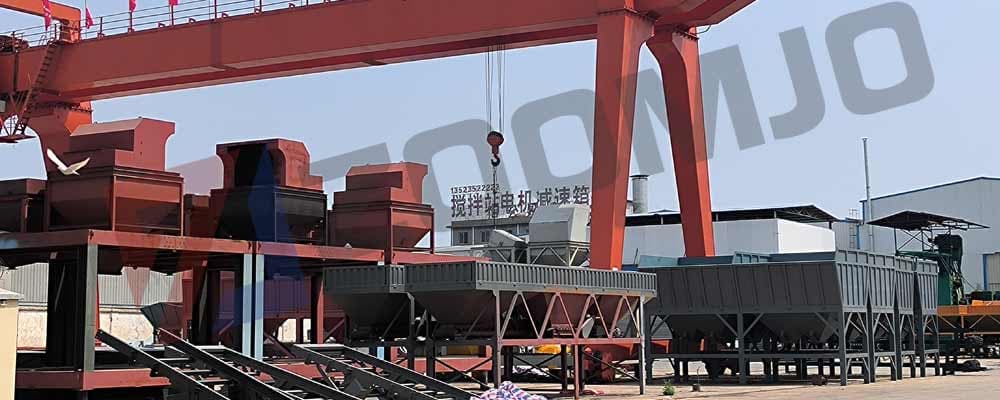
[Durability and Energy Consumption]
The durability and energy consumption of the concrete mixing plant are also important considerations. Equipment with high durability can withstand long and high-intensity use, reducing the frequency of repair and replacement. Meanwhile, choosing a concrete mixing plant with low energy consumption can reduce energy costs and improve production efficiency.
[Return on Investment]
Assessing the return on investment of concrete mixing plant is an important factor in decision making. Considering the price, service life, maintenance cost and productivity of the equipment, a comprehensive analysis of the return on investment can help you make an informed decision. The following are some factors to consider:
Equipment price: The price of the concrete mixing plant will affect the return on investment. A lower purchase cost may result in a faster payback period, but quality and performance also need to be considered.
Service life: Consider the expected service life of the concrete batching plant. Durable and long-lasting equipment will reduce the frequency of repairs and replacements, reducing costs and extending the payback time.
Maintenance Costs: The maintenance costs of a concrete batching plant include regular maintenance, parts replacement and repair costs. Choosing equipment that is easy to maintain and has access to parts can reduce maintenance costs and improve return on investment.
Productivity: An efficient concrete batching plant increases production capacity and efficiency, resulting in increased concrete production and sales. Consider factors such as the plant's mixing effectiveness, discharge speed and automation to ensure high production efficiency.
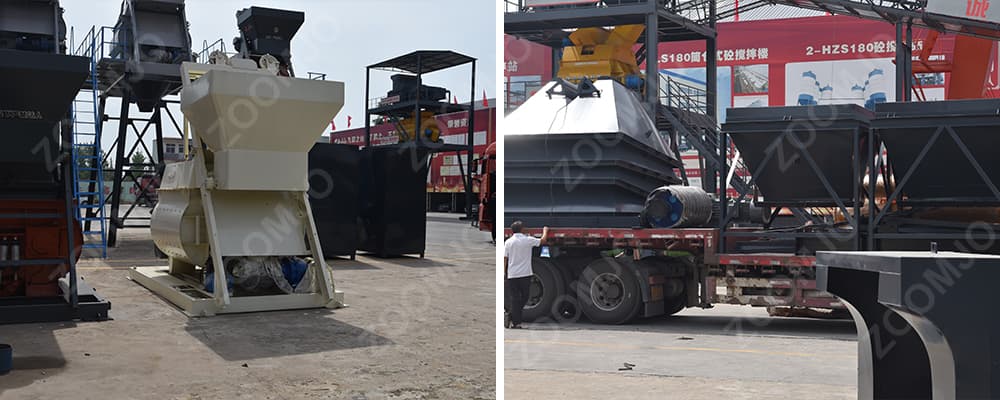
Cost savings: The performance of a concrete mixing plant in terms of energy consumption and raw material utilization can also affect the return on investment. Choosing equipment with low energy consumption and saving raw materials can reduce production costs and increase the return on investment.
Market Demand: Study the market demand and competition in the region to determine the return on investment potential of the concrete mixing plant. Understand the number and size of projects and forecast the potential market demand.
Return on Investment Calculation: Perform a return on investment calculation by considering equipment price, service life, maintenance costs, production efficiency and market demand. This helps you evaluate the payback cycle and potential profit.
A detailed return on investment analysis by considering price, service life, maintenance cost, production efficiency and market demand can help you make an informed decision and choose the most suitable concrete mixing plant to maximize your return on investment.

[Famous Plants]
ZOOMJO is a leading global supplier of concrete mixing plants, and we offer many types of high-quality products to meet our customers' needs. Our products include stationary concrete mixing plants, mobile concrete mixing plants, foundation-free concrete mixing plants, concrete mixing pumps, concrete drag pumps and self-loading mixers.
Our products are exported worldwide, covering more than 105 countries and regions, including the Philippines, Indonesia, Malaysia, Singapore, Sri Lanka, Kazakhstan, Uzbekistan, Russia, Ukraine, Ethiopia, South Africa, Nigeria, Jamaica, Dominica and Australia. We have won the trust and praise of our customers for our excellent quality and reliable performance.
Whether it is a large project or a small construction task, ZOOMJO's products provide efficient and reliable concrete mixing solutions. We are committed to providing our customers with quality equipment and a full range of pre-sales consultation, after-sales service and technical support to ensure that they get the best return on investment and user experience when using our products.
By choosing ZOOMJO, you will get a reliable partner to provide comprehensive solutions for your concrete mixing needs.

 English
English  Español
Español  简体中文
简体中文  Pусский
Pусский  українська
українська 
